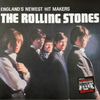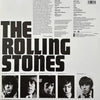



The Rolling Stones – England's Newest Hit Makers (Mono, DSD, DMM) - Unsealed
Rarity - Unsealed
The Rolling Stones [click here to see more vinyl featuring The Rolling Stones]
Mick Jagger – vocals, handclaps, tambourine; harmonica (A4, B1), maracas (A1)
Keith Richards – backing vocals, lead and rhythm (6- and 12-string) guitars
Brian Jones – backing vocals, rhythm guitar; lead guitar (B1); slide guitar (B6); harmonica (A1, A3, A5); tambourine (B3, B4); whistling (B6)
Bill Wyman – backing vocals, bass, handclaps
Charlie Watts – drums, handclaps
Backing vocals - Allan Clarke (A6), Graham Nash (A6)
Phil Spector – percussion (all tracks), maracas (A6)
Gene Pitney – piano (A6)
Ian Stewart – organ (A5, B5); piano (B3-4)
Arranged by The Rolling Stones
Written by Buddy Holly (A1), Norman Petty (A1), Bobby Troup (A2), Willie Dixon (A3), Jimmy Reed (A4), Nanker Phelge (A5-6), Phil Spector (A6), James Moore (B1), Chuck Berry (B2), Mick Jagger & Kith Richards (B3), Brian Holland (B4), Lamont Dozier (B4), Eddie Holland (B4), Ted Jarrett (B5), Rufus Thomas (B6)
1 LP, standard sleeve
Original analog Master tape : YES (DSD remastered)
Heavy Press : 180g
Record color : black
Speed : 33 RPM
Size : 12'’
Mono
Studio
Record Press : Pallas
Label : ABKCO
Original Label : Decca
Recorded 3 January – 25 February 1964 at Regent Sound Studio, London
Produced by Eric Easton, Andrew Loog Oldham
Engineered by Bill Farley at The Magic Shop
DSD Engineer – Gus Skinas
Mastered by Bob Ludwig at Gateway Mastering
Direct Metal Mastering by Don Grossinger
Liner Notes by Andrew Loog Oldham
Photography by Nicholas Wright
Originally released in April 1964
Reissued in 2003
Tracks :
Side A:
- Not Fade Away
- Route 66
- I Just Want To Make Love To You
- Honest I Do
- Now I've Got A Witness
- Little By Little
Side B:
- I'm A King Bee
- Carol
- Tell Me
- Can I Get A Witness
- You Can Make It You Try
- Walking The Dog
Awards:
The album was included in Robert Dimery's 1001 Albums You Must Hear Before You Die
The album was voted number 418 in Colin Larkin's All Time Top 1000 Albums
Reviews:
“The Stones’ debut knocked The Beatles from the chart summit… They were on their way.
The Rolling Stones’ debut single was a Chuck Berry cover, their second a Lennon-McCartney tune, and third a Buddy Holly number. Their first EP was packed with similarly cynically mainstream and/or romantic fare. Only with the release of their eponymous debut LP did they reaffirm the bluesiness in which they were steeped and which had obtained them a record contract in the first place.
Released in April 1964, The Rolling Stones was – according to guitarist Keith Richards – half-comprised of rough mixes precipitously rushed onto the market by their manager (and the album’s nominal producer) Andrew Loog Oldham. It's a testament to the group’s brilliance that the result was still the best album to emerge from the early 1960s British blues boom.
It can't be seriously posited as a heavyweight artistic statement insofar as the Jagger/Richards songwriting team had yet to develop: only three of the tracks are originals. Moreover, Mick Jagger sounds like the Welfare State whitey he is.
Set against the dependency on covers and the inexperienced vocalist, however, is a truly cooking and imaginative band. Drummer Charlie Watts and bassist Bill Wyman provide a brawny frame for the intermeshing guitars of Richards and Brian Jones as the ensemble lovingly deliver some of their favourite shots of rhythm ‘n’ blues.
Between the breakneck travelogue opener Route 66 and the madcap parting shot Walking the Dog, however, the Stones crucially sidestep the mistake committed by many others on the scene in thinking that high quality is enough. The shimmering surrealism of Mona, the sensuality of I’m a King Bee, the romanticism of Tell Me and the soulfulness of You Can Make It If You Try create a variety of moods and textures that obviates ‘blueswailing’ one-dimensionality.
The album was issued as England's Newest Hit Makers in the States, with Not Fade Away (which opened proceedings) displacing Mona, and did moderately well. In Britain, its release was an event. Despite daringly featuring no artist name or title on its half-lit cover, it became the first non-Beatles album to top the charts since May 1963. The Stones had not yet achieved the “way of life” status claimed for them in Oldham’s sleevenotes, but they were well on their way.
Indeed, it was a remarkable enough record to consign to the folds of history the fact that the Stones sold out before they got cred.” BBC Review by Sean Egan
Direct Metal Mastering
In Direct Metal Mastering, the cutting lathe engraves the audio signal directly onto a copper-plated master disc, instead of engraving the groove into a lacquer-coated aluminum disc.
The direct metal mastering technology addresses the lacquer mastering technology's issue of pre-echoes during record play, caused by the cutting stylus unintentionally transferring some of the subsequent groove wall's impulse signal into the previous groove wall. In particular, a quiet passage followed by a loud sound often clearly revealed a faint pre-echo of the loud sound occurring 1.8 seconds ahead of time (the duration of one revolution at 33 rpm). This problem could also appear as post-echo, 1.8 seconds after a peak in volume.
Another improvement is noise reduction. The lacquer mastering method bears a higher risk of adding unwanted random noise to the recording, caused by the enclosure of small dust particles when spraying the silvering on the lacquer master, which is the necessary first step of the electroplating process for reproduction of the master disc. As the DMM master disc is already made of metal (copper), this step is not required, and its faults are avoided.
With the groove being cut straight into a metal foil, this removed a number of plating stages in the manufacturing process. This gave rise to more upper frequency levels and less surface noise. Additionally, groove pre-echo problems are significantly diminished. Bass is typically tight and well defined, even described as more accurate than the fat, mushy sound of lacquered vinyl pressings.
Ratings :
AllMusic : 4.5 / 5 ; Discogs :

